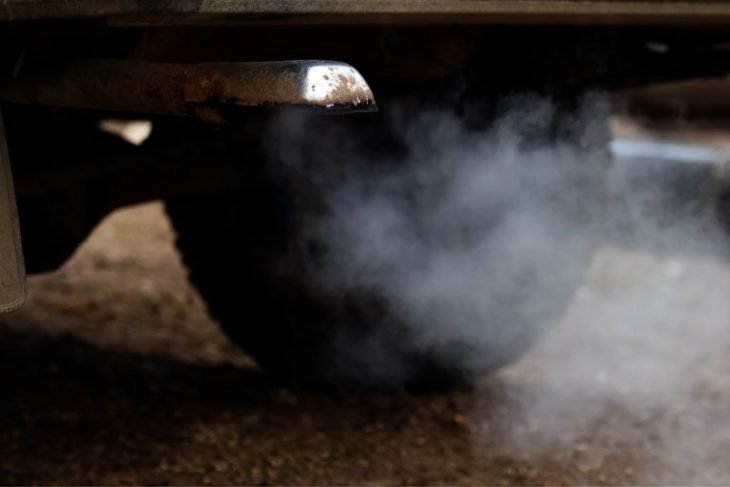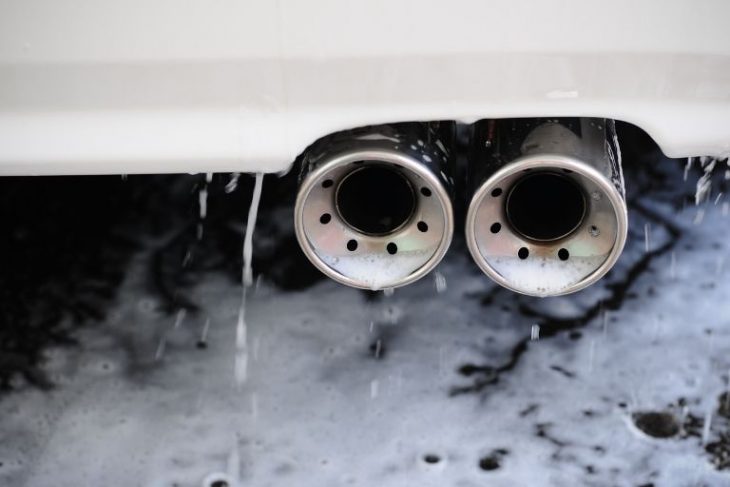Since motor vehicles are made up of many parts, it’s only natural that along the way some of them begin to experience problems. One of the most common areas of a car that experiences issues is the exhaust system, which can over time develop a leak that may become serious if not addressed.
If you’ve never experienced an exhaust leak with your car, common symptoms of an exhaust manifold leak can include such things as:
- Loud engine noise
- Increasingly poor fuel economy
- Vibrations in your cabin and engine bay
- A buildup of exhaust fumes in front of the vehicle
- Popping and Puffing Noises
- Carbon Monoxide leaks
- Oxygen sensors warning
Like anything else with your car or truck, an exhaust problem won’t simply disappear on its own. Unfortunately, it will only worsen. Rather than let what may initially be a minor and very fixable problem become a more complex and expensive repair job, here’s what an exhaust leak sounds like and how it can be fixed.
Table of Contents
- How Can I Tell if I Have an Exhaust Leak?
- Can You Hear an Exhaust Leak at Idle?
- Is It Bad to Drive with an Exhaust Manifold Leak?
- What Causes an Exhaust Manifold Leak?
- How Much Does it Cost to Fix Exhaust Manifold Leaks?
- What Does an Exhaust Manifold Leak Smell Like?
- How Does an Exhaust Manifold Leak Result in Poor Gas Mileage?
- What If I Need a Temporary Fix?
- Wrapping up exhaust leaks and issues
How Can I Tell if I Have an Exhaust Leak?

Since your exhaust system runs from the front of your vehicle to its rear, you may have to be a bit of a detective to determine not only if you actually do have an exhaust manifold leak, but also where it is located.
For starters, don’t try to inspect your exhaust system as soon as you pull into your driveway and turn off the engine, since your muffler, heat shield, pipes, and other system components will be extremely hot. Start by completing a visual inspection, pop your hood, and examine the exhaust manifold, which allows exhaust gases to exit your engine.
From there, it’s a matter of following the exhaust pipes to the end of the tailpipe. Should you see any areas that are cracked, dented, rusted, or have chunks of metal missing from them, chances are that is the source of your exhaust manifold leak. Don’t forget to check the heat shields for damage to
Many times the issue can be traced back to the exhaust manifold gasket. If you have a faulty exhaust manifold gasket, it will cause a leak that sounds like a hissing or tapping sound.
Can You Hear an Exhaust Leak at Idle?
If your car does suffer from an exhaust leak, you should be able to hear it when the car is idling. This is particularly true when the problem is emanating from your car’s exhaust manifold, where a crack or lack of sealing will produce an extremely loud engine noise upon startup especially a cold start. In fact, the noise from an exhaust leak of this nature will be most pronounced when you initially start up your vehicle.
Is It Bad to Drive with an Exhaust Manifold Leak?
The answer to this question depends on several factors, such as where the leak is located on your exhaust. Ultimately, if you notice a leak you should get this repaired ASAP as harmful fumes will be entering the atmosphere, damaging health, and the planet.
If it is impacting your ability to safely operate your car in regards to excessive vibrations or other issues, and whether or not any exhaust fumes are entering the cabin.
If your vehicle has a muffler, heat shield, or exhaust tailpipe with a large hole in it and is making very loud noises while being driven, police could potentially pull you over and issue you a ticket for driving an unsafe vehicle. In addition, no vehicle that is suffering from an exhaust manifold leak will pass a state inspection, so keep this in mind as well.
Finally, the longer you let the problem persist, the harder it becomes on your car’s exhaust system, engine, and other components, meaning other systems of your vehicle may require repairs.
What Causes an Exhaust Manifold Leak?
Even if you are very careful with your vehicle and try to maintain it as well as possible, exhaust leaks are almost inevitable. For most exhaust systems that spring a leak, corrosion is to blame. While the stainless steel that comprises your exhaust system is known for its toughness, it can take only so much of hot and cold temperatures, being pelted with gravel and road tar, and other various things.
In addition, since not every road is perfectly smooth, potholes and bumps can wreak havoc on exhaust systems, particularly those that may be low-hanging or already a bit lose. Finally, Father Time has a way of putting an end to even the toughest of exhaust systems.
Whether it’s an exhaust manifold gasket that degrades and allows leaks to occur or a muffler that has seen better days, many factors can contribute to an exhaust manifolds leak.
How Much Does it Cost to Fix Exhaust Manifold Leaks?

When it comes to repairing a leaking exhaust manifold, you should take it to a qualified auto maintenance shop unless you are very skilled at automotive repair and know exactly what you are doing each step of the way.
If you take it to a shop for the necessary repairs, parts, and labor will generally cost as little as $150 to as much as $400, depending on what repairs need to be done. If you are very fortunate and only need a small area of an exhaust pipe welded, you can often get by with well under $100 for this repair.
Cost of Delayed Repair
If you put off going to a repair shop you could increase your bill significantly. After the combustion process, these gases escape when leaving the combustion chamber. The gases are incredibly hot and can cause serious damage and premature wear to other parts of your engine, or even the catalytic converter. As a result of exhaust leaks, you could end up with a larger repair bill.
What Does an Exhaust Manifold Leak Smell Like?
Once exhaust gases start escaping from your vehicle’s exhaust system, you’ll start to smell exhaust fumes. Generally, you’ll first notice a stronger smell of gasoline, which will be followed by the smell of metal burning.
While an exhaust manifold leak usually does not lead to a fire or other related issues, it may be a good idea to pull over and take a quick look just to make sure you have a better idea of what is occurring. In most cases, the smell will only be a nuisance that will disappear once the leak is repaired.
Ticking, Popping, and Puffing
Rather than having your car purring like a kitten while it’s being driven, it will instead remind you of a piece of machinery that has something amiss. In fact, expect to hear anything from ticking, popping, and puffing noises to buzzing and hissing that will not only get louder and louder as the problem worsens, but also change frequencies.
How Does an Exhaust Manifold Leak Result in Poor Gas Mileage?
As for why an exhaust manifold leak results in worsening gas economy while you’re driving, it is due to decreased pressure in your exhaust system leading to lower performance and more fuel usage. When pressure drops, your car’s oxygen sensor, commonly called the O2 sensor, gets tricked into believing the vehicle’s engine does not have the correct mixture of fuel and oxygen.
When this happens, the vehicle’s Electronic Control Unit (ECU) increases fuel delivery to the engine, resulting in a mixture that becomes too rich and thus decreases your vehicle’s mileage. In addition to the decreased fuel efficiency, this response will also likely trigger a loss of power when you try to accelerate since the air-gas mixture has to be just right for maximum performance.
Keep an eye out for loss of performance when pressing on the gas pedal.
What If I Need a Temporary Fix?
Depending on the severity of the exhaust manifolds leak and where it is located, you may be able to use a few very budget-friendly and quick fixes to temporarily solve your problem. These usually include putty, or sealants, all of which can be applied to pipes and mufflers as a band-aid for the problem.
Even if these do work for the moment, don’t get complacent about getting a permanent fix as soon there will be exhaust fumes in the cabin, increased sound levels, and a burning smell. Sometimes the fix will be as simple as requiring a new manifold gasket, this is usually a quick and inexpensive repair requiring only time and a gasket.
Wrapping up exhaust leaks and issues
Now that you know what an exhaust manifold leak sounds like, what causes a leak, and the many ways a leak can be fixed, head to your nearest mechanic the minute you start to hear hearing a loud noise and seeing black soot before new leaks appear and the noise gets louder. Getting this fixed quickly will hopefully mean, you only need a new gasket and not a new engine.
Always pay attention to changes in engine sounds and look out for the other symptoms of exhaust manifold leaks.
Recommended Reading
How to Make Your Car Quieter Inside
If you want to be able to hear a pin drop while behind the wheel of your vehicle, here are some of the best ways you can go about making your car quieter inside.
Common Catalytic Converter Rattles and How to Quiet Them
After having driven your car for hundreds of thousands of miles, you might start noticing some odd symptoms. Maybe the check engine light comes on, you...
How to Reduce Road Noise in Car (Soundproofing Car Road Noise)
In this article, we have shared information on How to Reduce Road Noise and How to Soundproof a Car. This includes Car or Automotive Sound Deadening and Soundproofing.
10 Best Oil Additives to Quiet Noisy Lifter with Reviews
Looking for the best lifter noise additive for your vehicle? If you’re unsure which additives for noisy lifters is best, then read on!
What is an acoustic windshield?
An acoustic windshield is just like a regular windshield, with the added benefit of blocking outside sounds from coming into the cabin.
7 Best Sound Deadening Materials for Cars
In this article, we have listed 10 best car or automotive sound deadening materials that are available in the market. We have also listed their unique features and why you should buy them.